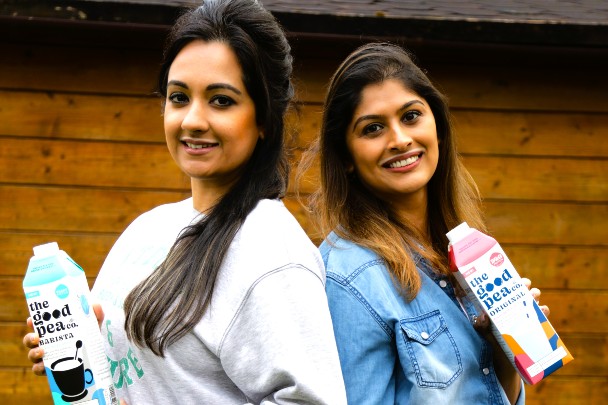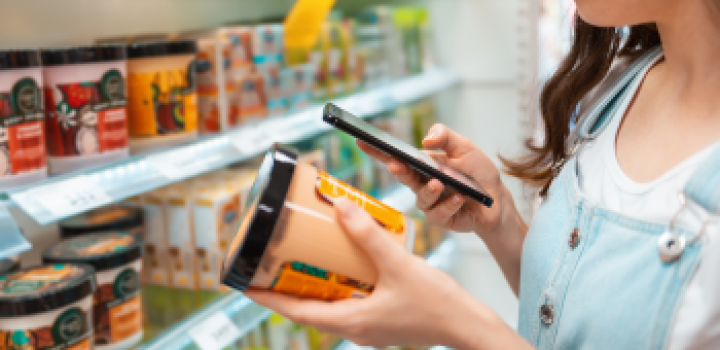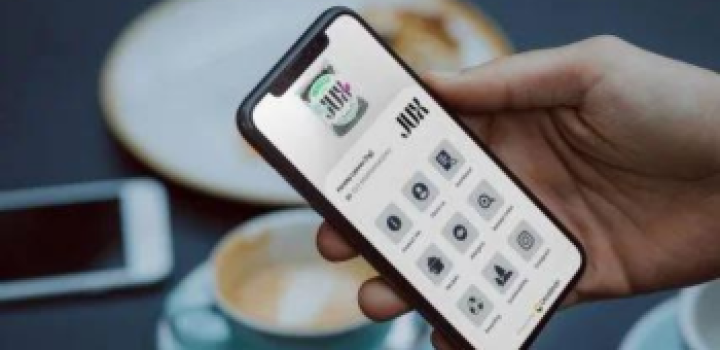Close friends Suhani Bhudia and Nikki Garg had long wanted to combine forces on a purpose-led business.
But it wasn’t until the first UK lockdown in 2020, when their desire to give back to their community was at an all-time high, that they spotted a gap in the market that felt like a good fit.
Suhani daughter was struggling with a temporary intolerance to lactose while Nikki was looking to transition to a plant-based diet as a way to manage allergies in her own family. Both friends found themselves trawling the supermarket aisles for dairy-free milk alternatives that tasted good, contained all the right nutrients and didn’t harm the planet.
They couldn’t find anything that ticked all the boxes, remembers Suhani. “The ones that tasted really nice didn’t have the nutrition and the ones that did, didn’t taste good,” she says. “We realised that people were either compromising on taste or nutrition and if we could give them both, it would be a win-win.”

Nikki Garg and Suhani Bhudia
Discovering "green gold"
Finding that holy grail ingredient was a learning curve for the entrepreneurs, who hailed from careers in finance and dentistry. But when they stumbled across a 2019 TED talk by Julia Albrecht on how peas could save the planet, it felt like the stars had aligned.
“Both of us have Indian heritage and have grown up eating lots of peas and lentils in curries so we knew some of the nutritional benefits,” says Suhani. Inspired, they went onto read everything they could about the vegetable’s environmental impact too. They found out that peas also made their own natural nitrogen fertiliser which avoided the use of chemicals and helped keep water sources clean, making them a far more sustainable than many alternatives. “We were like, yes, these are gold.”
Within days they were whipping up recipes in their kitchen and trialling their efforts on family members, coming up with three or four options for a pea milk before investing in a food technologist to take the R&D to the next level. “It was expensive, but we knew we wanted to do this.”
The process from that first product concept to their first commercial pea milk was a challenging one, admits Suhani. “It was an emotional rollercoaster,” she laughs. The duo had no contacts in the “cutthroat” fmcg industry at first. They had to pitch to their first manufacturer to convince them to take the product on and relied on plenty of networking to build up the right contacts. That was coupled with the logistical headaches and delays caused by both Brexit and the COVID 19 pandemic.
But 18 months on, they had their first commercial milk alternative – a high-protein blend of yellow split peas and coconut cream - ready for sale.
‘No, it doesn’t taste like mushy peas’
Since that first launch The Good Pea Co. brand has gone from strength to strength.
The milk alternative is now widely available in foodservice and hospitality venues – it even replaced all dairy milks at Kings College London. It’s listed in around 50 independent health stores, says Suhani, and was rolled out in Selfridges in 2022 as well as Amazon last October. Last year, it successfully closed a £180k funding round on Seedrs.
There are also now two products in the range: original and Barista. The pair discovered that, while the original SKU was perfect for using in smoothies or sloshing on bowls of cereal, it’s high-protein content was splitting the milk in coffee and tea. So, they created the Barista variant, which has around half the protein but delivers the perfect level of froth.
When people taste either milk, they love it, explains Suhani. For example, “the more we’ve trialled the Barista milk with people the more they’re like, ‘oh my god, this tastes just like dairy milk.’” At trade shows, the Good Pea Co. is consistently ranked higher than the competition on taste too, she adds.
But the brand does still face a challenge when it comes to the lack of knowledge or awareness around pea milks.

“Not many people have actually heard about pea protein milks or pea milks. The first thing that they usually ask us is ‘is it green?’ or ‘does it taste like mushy peas? We have to say no, it’s not green. It looks like milk.
“They’re always pleasantly surprised when they try it though,” she adds. [But] “we have to educate them on what it is and how it’s made. And we love doing that. We love talking to people and seeing their first-hand reactions.”
It isn’t possible to stand in front of every potential consumer and overcome their scepticism with a physical sample, however. Which is why – as the pair look to drive further growth – they’re actively hunting out ways to share both their brand story – “people buy from people” - and information and insights on their very own ‘green gold.’
Unlocking the benefits of QR codes powered by GS1
Finding a way to educate consumers on both the brand and the product at scale was what compelled them to take part in GS1 UK and Orca Scan’s QR pilot. “The minute GS1 UK reached out, we were definitely in – it’s such a clever idea.”
The entrepreneurs were already converts to the usefulness of integrating GS1 barcodes from day one, a decision they say helped simplify and speed up the sometimes-complex onboarding process at retailers, but Suhani says they’ve now discovered multiple uses for the QR technology too.
“Yes, getting the story out there using a QR code powered by GS1 has been huge for us… but it can do so much more than that,” she says. The brand has also used it to help to spread the word around any upcoming promotions or events; to share its sustainability credentials with trade customers and even gather feedback from end consumers on why they buy the brand and what they like about it.
"The team is currently working to calculate its carbon footprint too, assessing the impact of its production from sourcing pea protein in Belgium to manufacturing the milk alternative in Somerset. Once finalised, this will also be shared via the QR code. The brand attributes an uplift on their website and social channels to the technology which in turn has helped fuel sales.
“It offers you flexibility with how you're doing your marketing and takes the pressure off your packaging at a time when it’s important to stand out on shelf,” sums up Suhani.
Taking a leap of faith
Four years after they first took the plunge, The Good Pea Co. founders have all sorts of exciting plans in the pipeline, including a top-secret product that is something “nobody in the UK currently offers.”

Suhani has only one piece of advice for would-be entrepreneurs looking to follow in their footsteps: “just do it.”
“You just have to take the leap of faith. Everybody's got great ideas in their head, but nobody's got the actual courage to start doing it. So, follow your heart and follow your ambition.”
Otherwise, you’ll never know if you could’ve struck gold.
Find out more

Scan smarter with QR codes powered by GS1
Consumers, brands, retailers and regulators are all seeking better ways to access this information. QR codes powered by GS1 bridge this gap, empowering you to deliver rich data and connect with your audience on a deeper level. Unlock the power of next generation barcodes and discover how they can transform your business.

Orca Scan
Orca Scan is the one-stop platform for all things barcodes. This platform enables anyone to build a barcode system without code or technical skills. Barcode creation, printing, and scanning come together in a simple to use solution that works everywhere. Trusted by more than 50,000 organisations in 165+ countries.
